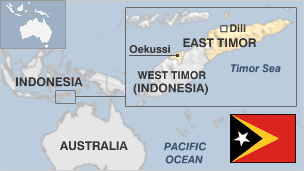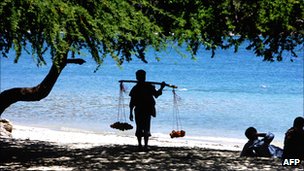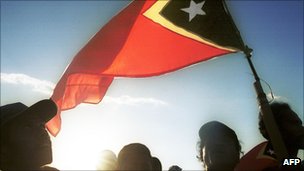East Timor profile

East Timor's road to independence - achieved on 20 May 2002 - was long and traumatic.
The people of the first new nation of the century suffered some of the worst atrocities of modern times.
An independent report commissioned by the UN transitional administration in East Timor said that at least 100,000 Timorese died as a result of Indonesia's 25-year occupation, which ended in 1999.
Portugal began to establish colonial control over Timor in the 16th century, when the island was divided into small states. The Netherlands later colonised the west of the island, which was formally partitioned between the two imperial powers in 1916.
At a glance

- Politics: East Timor became independent in 2002 following a bloody separation from Indonesian occupation
- Economics: Country suffers extreme povery and corruption, but has plentiful oil and gas reserves
- International: UN peacekeepers bolstered the emerging security services during first decade of independence
Country profiles compiled by BBC Monitoring
Portugal invested little in Timor, and withdrew unilaterally in 1975 after deciding to dissolve its colonial empire.
Indonesia invaded within days of the Timorese declaration of independence, and used force to crush popular resistance.
Major world and regional powers did little to counter Indonesian rule, which was not recognised by the UN. Falintil guerrillas fought for independence, and their cause captured world attention in 1991 when Indonesian forces opened fire on a memorial procession in the capital, Dili, killing at least 250 people.
International pressure increased and finally persuaded Indonesia to allow an independence referendum in 1999, during which a pro-Indonesian militia, apparently with Indonesian army support, tried in vain to use terror to discourage voters.
When the referendum showed overwhelming support for independence, the militia went on the rampage, murdering hundreds and reducing towns to ruins. An international peacekeeping force halted the mayhem and paved the way for a United Nations mission which helped reconstruct East Timor.
The rebuilding of East Timor has been one of the UN's biggest success stories. The UN Mission of Support in East Timor, Unmiset, wound up in May 2005.
 East Timorese greeted independence in 2002 with jubilation
East Timorese greeted independence in 2002 with jubilation
But security has been precarious. An outbreak of gang violence in 2006 prompted the UN Security Council to set up a new peacekeeping force, Unmit. The UN said poverty and unemployment had exacerbated the unrest.
As one of Asia's poorest nations, East Timor will rely on outside help for many years. The infrastructure is poor and the country is drought-prone.
However, vast offshore oil and gas fields in the Timor Sea hold much potential. East Timor and Australia have agreed to share revenues from the reserves. As a part of the deal, a decision on the disputed maritime border in the area was deferred.
East Timor is trying to foster national reconciliation. Indonesia and East Timor set up bodies to bring the perpetrators of the 1999 violence to justice. However a 2005 UN report concluded that the systems had failed to deliver. The Indonesian special court acquitted most of the 18 indicted suspects.


 Australia shock at asylum tragedy
Australia shock at asylum tragedy Army clearing Cairo protesters
Army clearing Cairo protesters Nuclear shadow
Nuclear shadow No smoke without ire
No smoke without ire Mars Rover
Mars Rover Snap decision
Snap decision The end of disease?
The end of disease? Talking Movies
Talking Movies